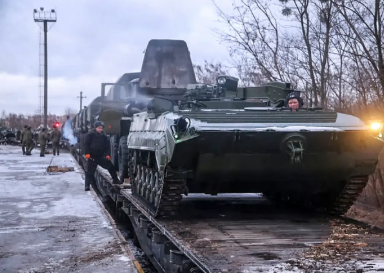Written by: Alex Mueller, Staff Writer
TENSION: Recent conflicts on the Ukrainian border heighten concerns of a potential Russian invasion.
In 2014, tensions between Ukraine and Russia escalated, as Ukrainian protestors revolted and deposed their pro-Russian President Viktor Yanukovych. Subsequently, Russia occupied and annexed Crimea, while additionally supporting pro-Russian, separatist factions in the Donbas region of Eastern Ukraine. Ukraine in many ways ultimately fell between Russian interests, particularly in its Eastern and Southern regions, but its new administration nonetheless displayed a significant desire to integrate with other European nations. Now, these conflicting interests fuel an ongoing geopolitical crisis, capable of initiating global conflict.
Russia, in late 2021, began amassing troops near its Ukrainian border, with media outlets such as the BBC and the New York Times estimating the accumulation of more than 100,000 military personnel. Moreover, large-scale military exercises, particularly on the Ukraine-Belarus border further provoked concerns of a potential invasion. In response to such pressure and the possibility of war, NATO members, including the United States and Canada, sent weapons and other military supplies to Ukraine, continuing to provide them throughout January of this year. As Russia maintains its militaristic pressure and the United States places 8,500 troops on high-alert, tensions between these powers will seemingly aggrandize.
However, in an interview recorded by the news outlet Global News, Russian President Vladimir Putin affirmed that Russia maintains “a peaceful foreign policy,” citing his nation’s political concern for “the prospect of Ukraine joining NATO” and opposing the supposedly “provocative” nature of questions addressing invasion. Russia vehemently rejects claims regarding its seemingly aggressive role in Ukraine; Putin and, by extension, the wider Russian government view the West and Kiev as the true aggressors. To Russia, they seemingly heighten conflict through their military build-up and oppositional cooperation. Putin emphasized Russia’s supposedly simple desire to halt Ukraine’s perceived anti-Russian path. According to the Russian government and Putin’s words, Moscow merely seeks to secure its foreign and defensive interests through the militarization of Ukraine’s border. “Each country has the right to defend its frontiers and ensure its own security” and “take precautions” Alexander Grushko, the deputy foreign minister of Russia, stressed in a press conference with The Russian News Agency (TASS).
On the other hand, Ukraine and NATO view Russia as the overarching aggressor. To Kiev, Russia’s actions, including their annexation of Crimea, support of separatism in Donbass, and seemingly abrupt militarization, jeopardize Ukrainian stability and sovereignty. On January twenty-fourth, the Ministry of Foreign Affairs Ukraine recorded a conversation between the Georgian and Ukrainian foreign ministers, emphasizing their unwillingness to provide “any concessions to Russia on Ukraine’s and Georgia’s integration into NATO.” In other words, Kiev strongly resists Russia’s demands against its Western integration, championing Ukrainian political autonomy. Ukraine’s president, Volodymyr Zelensky, even necessitated Russia’s acceptance of a peaceful “reintegration of [Ukrainian] territories” in a press statement with the Global News, dispelling the prospect of large-scale political concessions.
Speaking to NBC News, United States President Biden asserted that “Russia will be held accountable if it invades” but merely addresses a Russian invasion as hypothetical and outside their national interest. Indeed, both sides, including Ukraine, NATO, and Russia, accentuate a desire for negotiation – not pure warfare – to secure their interests. Biden, Putin, and Zelensky each publically punctuate desires for peace. Yet, Ukrainian and Russian interests as while as actions remain vastly divergent. Russia seeks to prevent NATO expansion and secure its political holdings in Donbass and Crimea, while Ukraine seeks the return of its territory and the withdrawal of Russian intervention in its affairs. With both sides seeking full political concessions and troops already deployed or alerted, political compromise will prove necessary to prevent further conflict. However, this willingness to negotiate, by offering the tools of de-escalation, may ultimately increase the potential for peace.

